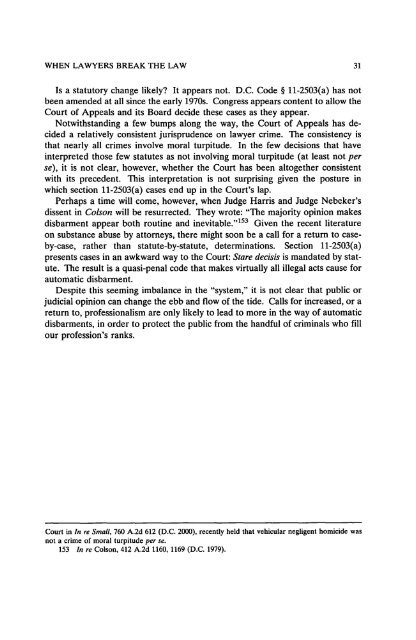The University of the District of Columbia Law ... - UDC Law Review
The University of the District of Columbia Law ... - UDC Law Review
The University of the District of Columbia Law ... - UDC Law Review
You also want an ePaper? Increase the reach of your titles
YUMPU automatically turns print PDFs into web optimized ePapers that Google loves.
WHEN LAWYERS BREAK THE LAW 31Is a statutory change likely? It appears not. D.C. Code § 11-2503(a) has notbeen amended at all since <strong>the</strong> early 1970s. Congress appears content to allow <strong>the</strong>Court <strong>of</strong> Appeals and its Board decide <strong>the</strong>se cases as <strong>the</strong>y appear.Notwithstanding a few bumps along <strong>the</strong> way, <strong>the</strong> Court <strong>of</strong> Appeals has decideda relatively consistent jurisprudence on lawyer crime. <strong>The</strong> consistency isthat nearly all crimes involve moral turpitude. In <strong>the</strong> few decisions that haveinterpreted those few statutes as not involving moral turpitude (at least not perse), it is not clear, however, whe<strong>the</strong>r <strong>the</strong> Court has been altoge<strong>the</strong>r consistentwith its precedent. This interpretation is not surprising given <strong>the</strong> posture inwhich section 11-2503(a) cases end up in <strong>the</strong> Court's lap.Perhaps a time will come, however, when Judge Harris and Judge Nebeker'sdissent in Colson will be resurrected. <strong>The</strong>y wrote: "<strong>The</strong> majority opinion makesdisbarment appear both routine and inevitable.,,153 Given <strong>the</strong> recent literatureon substance abuse by attorneys, <strong>the</strong>re might soon be a call for a return to caseby-case,ra<strong>the</strong>r than statute-by-statute, determinations. Section 11-2503(a)presents cases in an awkward way to <strong>the</strong> Court: Stare decisis is mandated by statute.<strong>The</strong> result is a quasi-penal code that makes virtually all illegal acts cause forautomatic disbarment.Despite this seeming imbalance in <strong>the</strong> "system," it is not clear that public orjudicial opinion can change <strong>the</strong> ebb and flow <strong>of</strong> <strong>the</strong> tide. Calls for increased, or areturn to, pr<strong>of</strong>essionalism are only likely to lead to more in <strong>the</strong> way <strong>of</strong> automaticdisbarments, in order to protect <strong>the</strong> public from <strong>the</strong> handful <strong>of</strong> criminals who fillour pr<strong>of</strong>ession's ranks.Court in In re Small, 760 A.2d 612 (D.C. 2000), recently held that vehicular negligent homicide wasnot a crime <strong>of</strong> moral turpitude per se.153 In re Colson, 412 A.2d 1160, 1169 (D.C. 1979).














